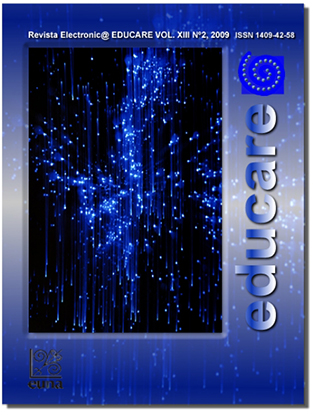Una retrospección y visión de futuro sobre el uso e implementación de las tecnologías de la información y la comunicación, para el aprendizaje virtual en el contexto de la División de Educología de la Universidad Nacional de Costa Rica
DOI:
https://doi.org/10.15359/ree.14-1.2Keywords:
teaching, learning, technologies, resources, bimodalAbstract
Division de Educología (School of Education for Secondary Level) of Universidad Nacional in Costa Rica, (UNA) has been aware of the necessary planning and thought of a future that demands a continuous reflection between what is possible and what is desirable. In this sense, the formation of future educators of the country in different specialties, should promote not only the use of the technology, but also the development of critical and objective thinking that will embrace its advantages and its limitations in the noble exercise of what is teaching and learning. Under the light of these precepts, in the year 2007, the educational research activity emerged by the name of Didactic Resources for Learning with a bimodal focus. The present article exposes the main ideas that have been matured after an experience of more than two years with this course, and it is also searching for recapturing a responsible way of planning, implementing and managing the policies of ICTs (Information and Communication Technologies) for the bimodal learning in the context of the Division de Educología (School of Education for Secondary Level) of UNA.
References
Becerra, M., Bavio, E., Díaz, E., Maggio, M., Martínez, L., Mena, M., et al. (s. f.). Comisión asesora
de educación a distancia. Informe final. Argentina: Ministerio de Educación, Ciencia y
Tecnología.
Duart, J. & Sangrà, A. (2000). Aprender en la virtualidad. Barcelona, España: Gedisa.
Espiro, S. (2008a). Aprendizaje. En: Antología utilizada en el Posgrado de especialización en entornos
virtuales del aprendizaje. OEI-Virtual Educa.
Espiro, S. (2008b). Aprendizaje adulto. En: Antología utilizada en el Posgrado de especialización en
entornos virtuales del aprendizaje. OEI-Virtual Educa.
García, A. (1998). Indicadores para la evaluación de la enseñanza en una universidad a distancia,
Revista Iberoamericana de Educación a Distancia, Nº 1, 63-85.
Juárez, A. & Assad, C. (2001). Gestión y evaluación de un sistema a distancia, en Red de Educación
a Distancia de las Universidades Nacionales Región Centro-Oeste, Nº1, 14-18.
Prieto, D. (2008a). Evaluación y seguimiento. En: Antología utilizada en el Posgrado de especialización
en entornos virtuales del aprendizaje. OEI-Virtual Educa.
Prieto, D. (2008b). Fase de planificación operativa. En: Antología utilizada en el Posgrado de especialización
en entornos virtuales del aprendizaje. OEI-Virtual Educa.
Prieto, D. (2008c). Planificar para construir futuro. En: Antología utilizada en el Posgrado de especialización
en entornos virtuales del aprendizaje. OEI-Virtual Educa.
Prieto, D. & Van de Pol, P. (2006). E-learning comunicación y educación. El diálogo continúa en
el ciberespacio. San José, Costa Rica: Radio Nederland Training Centre.
Vílchez, E. & Ulate, G. (2008). Curso Recursos didácticos para el aprendizaje. Una experiencia en
la virtualidad. Revista Cognición, Nº 14, 52-80.
Universidad Nacional. (2008). Modelo pedagógico institucional. Recuperado el 5 de noviembre de
, de http://www.una.ac.cr
Universidad Nacional. División de Educología. (2008). Misión y Visión de la Unidad Académica.
Recuperado el 5 noviembre de 2008, de http://www.una.ac.cr/cide/Educologia/index.html
Downloads
Published
How to Cite
Issue
Section
License
1. In case the submitted paper is accepted for publication, the author(s) FREELY, COSTLESS, EXCLUSIVELY AND FOR AN INDEFINITE TERM transfer copyrights and patrimonial rights to Universidad Nacional (UNA, Costa Rica). For more details check the Originality Statement and Copyright Transfer Agreement
2. REUTILIZATION RIGHTS: UNA authorizes authors to use, for any purpose (among them selfarchiving or autoarchiving) and to publish in the Internet in any electronic site, the paper´'s final version, both approved and published (post print), as long as it is done with a non commercial purpose, does not generate derivates without previous consentment and recognizes both publisher's name and authorship.
3. The submission and possible publication of the paper in the Educare Electronic Journal is ruled by the Journal’s editorial policies, the institutional rules of Universidad Nacional and the laws of the Republic of Costa Rica. Additionally, any possible difference of opinion or future dispute shall be settled in accordance with the mechanisms of Alternative Dispute Resolution and the Costa Rican Jurisdiction.
4. In all cases, it is understood that the opinions issued are those of the authors and do not necessarily reflect the position and opinion of Educare, CIDE or Universidad Nacional, Costa Rica. It is also understood that, in the exercise of academic freedom, the authors have carried out a rogorous scientific-academic process of research, reflection and argumentation thar lays within the thematic scope of interest of the Journal.
5. The papers published by Educare Electronic Journal use a Creative Commons License:















 The articles published by Educare Electronic Journal can be shared with a Creative Commons License:
The articles published by Educare Electronic Journal can be shared with a Creative Commons License: 



